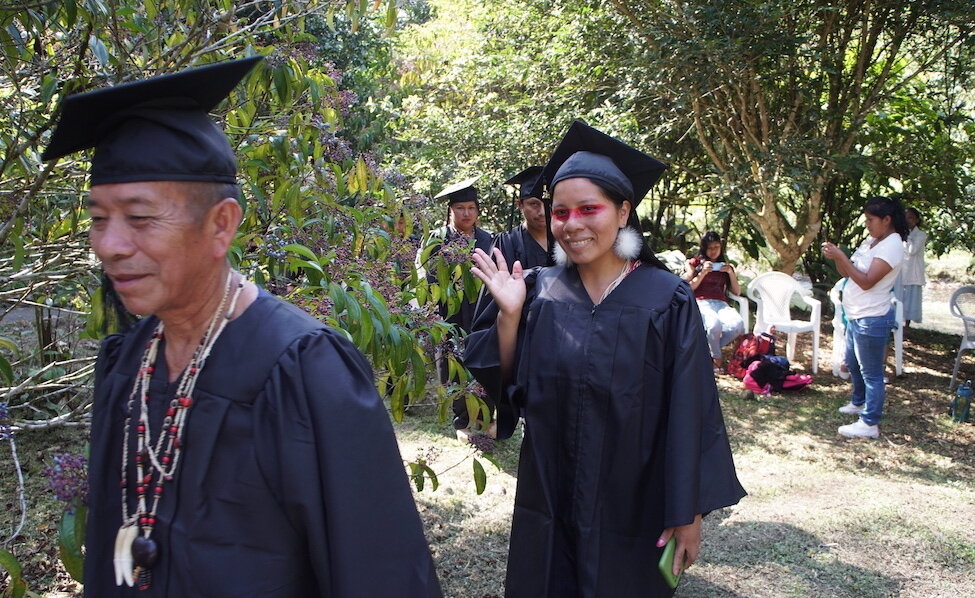Caring for our common home through community-based ecotourism
The Community-Based Ecotourism programme is garnering interest across continents, from the vast grasslands of Maasai Mara, to the Amazon Rainforest. As of last Spring, the programme is available in Spanish to different underserved communities in South America.

The Community-Based Ecotourism programme has become a key short-cycle academic programme offered by Jesuit Worldwide Learning (JWL). This 6-month programme, offered in collaboration with IQS (Spain) and the Pontificia Universidad Javeriana Cali (Colombia), is attracting new global interest. In April 2024, the Ecotourism programme saw the highest intake of students from diverse regions, including Kenya's Maasai Mara, Dzaleka refugee camp in Malawi, Kampala in Uganda, Zimbabwe, Guyana, and Afghanistan. The programme provides a sustainable solution for students worldwide, supporting them in overcoming socioeconomic and environmental challenges in the tourism industry.
In Kampala, Uganda, the programme served as a valuable opportunity for hundreds of urban refugees facing socioeconomic challenges and exclusion. With the coordination of the Jesuit Refugee Service (JRS), the local partner, the certificates were adjusted to meet local recognition requirements. Despite challenges such as disease outbreaks, many graduates secured jobs or started their own business in their communities and within the tourism industry.
In Kenya's Maasai Mara community, all graduates fund internships and placements in lodges and other ecotourism businesses. “As a steward of the Maasai Mara ecosystem I dream of a community that is dedicated to conservation efforts and wildlife protection. l hope to see initiatives that focus on preserving the natural habitats, biodiversity, and wildlife population that make our region so special, ensuring they can thrive for generations to come,” says Ellyn, a recent graduate, who adds that she “would highly recommend the [Ecotourism] programme to anyone looking to make a positive impact on the environment, support the local community, and experience the beauty of the natural world in a responsible manner.”
The academic delivery of the Ecotourism programme was not without challenges. April's floods and heavy rains posed significant challenges in Kenya and Malawi, particularly in Dzaleka refugee camp, making it difficult for students to reach the centres and often forcing them to cross dangerous rivers. Internet connectivity was frequently disrupted, hindering students' ability to attend classesand submit assignments. Students in Guyana's Amazonian region faced similar connectivity issues, living in remote areas.
Students overcame these challenges thanks the flexibility of the online facilitators who were very supportive and understanding of the conditions of the students, as well as the extended support and motivation given by the onsite facilitators. The offline app also helped them to keep up as much as possible with the course content.
In collaboration with the Pontificia Universidad Javeriana Cali and the Programa Universitario Amazónico (PUAM), Spring 2024 saw the launch of the Ecotourism programme in Spanish. It was first offered to members of indigenous communities in the Ecuadorian Amazon. This Summer, fifteen students of the Quechua and Waorani communities from Wawa Sumaco and Dicaro became the first graduates of the Spanish version of the Ecotourism programme. The graduation ceremony took place at the end of August in the presence of delegations from the Pontificia Universidad Javeriana Cali University and JWL leadership, at an ecolodge founded by graduates in Sumaco Napo-Galeras National Park. Graduates from Dicaro have also begun to establish their own ecotourism centre in their community, within Yasuní National Park, one of the most biodiverse places in the world.
The programme is gradually being rolled out with 85 new enrolled students in other community learning centres across Colombia and Ecuador. In Santo Domingo, Ecuador, students with hearing impairments recently embarked on their Ecotourism journey. Indeed, JWL programmes are designed and produced in a way that has proven helpful for persons with disabilities and so, in partnership with Fe y Alegría, JWL reaches out to such youth who are often excluded from educational opportunities.
The Global English Language (GEL) programme also plays a key role in these youth’s endeavours. These language skills are essential in order for them to welcome and engage with foreign visitors, effectively communicating about their history, culture, traditions, knowledge, and their environment. “We know that learning a language can be complicated, especially with the barriers that arise, but your commitment to our education give us the strength to keep moving forward,” said a GEL student in Dicaro, during the visit of JWL’s Executive President, Fr Peter Balleis SJ, and Armando Borja, Chief Operations Officer. “Your support, he added, “is planting a seed for a better future in our community.”